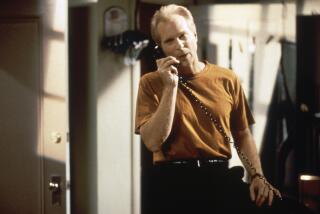Mitchum: Hollywood’s Enduring Bad Boy
- Share via
No two Hollywood biographies are alike but even as those biographies go, Robert Mitchum, who died Tuesday of lung cancer at 79, was in a class by himself. He was a legend, but never had to work at being a legend. He just lived it.
So far as is known, no other actor was arrested for vagrancy in Georgia and literally sentenced to work on a chain gang (180 days, he says; plenty long enough). He spent more time in his young life, from age 12, riding in freight cars than most people spend in coaches. In fact, he arrived in Los Angeles in what a song lyric calls “a sidedoor Pullman car.”
The most conventional thing Mitchum ever did, maybe the only conventional thing, was to marry his lovely and tolerant wife, Dorothy, in 1940 and make it last 57 years.
At the Lone Pine Film Festival a couple of years ago, Mitchum’s brother John, a rancher and sometime actor, remembered a distant day when they were filming a western at Goldwyn Studios. Bob loped in at 6 a.m. not having been to bed, eyes bloodshot and altogether worse for wear.
He sank in the makeup chair and said, “What can you do for me?” The makeup man shook his head and said, “Bob, I’m a dauber, not a plastic surgeon.”
The secret of his success on-screen was those famous hooded eyes, which seemed always like a match for inner qualities of brooding menace, a ready sexuality and a general volatility.
He appeared not to give a damn about stardom, which in itself helped propel him to stardom, and he appeared not to take acting seriously, which lent an easy naturalness and, accordingly, a feeling of truth to whatever he was doing on screen--including comedy, even though it’s always the darker Mitchum that comes first to mind.
*
He made it all seem so easy and natural that he was, in fact, easy to overlook when the awards were being handed out, and his only nomination for an Oscar was for best supporting actor in “The Story of GI Joe” in 1945. Yet his filmography is heavy with titles, “Night of the Hunter” most particularly, in which his presence, hinting of violence present and to come, lingers in the mind years later.
Mitchum remembered making a film with Loretta Young, who was being very demanding about the way she was being lit. Mitchum stood aside, amused.
“He’s been working in leak-light [spilled off of others] all his life,” she said. Even so, she said in mock-exasperation, “he’s a star.”
And he was, of course, a singular man who could make a joke of being jailed, for possession of marijuana. (In truth, he shrewdly guessed that if he didn’t play along with the press, they would do unpleasantly chiding stories about a fallen star, so he volunteered to pose in jail pushing a mop, as if the whole thing were a lark that, even to Mitchum, it wasn’t--more like a setup out of a film noir like those he did so well.)
What makes a star an icon is, naturally, a durability (still the most difficult of the Hollywood arts to conquer). But central to that durability is a kind of congruity, perceived if not entirely accurate, between on-screen and off-screen personas.
The private Mitchum was a reader, an auto-didact, as they say, by the necessities of a hard young life. Common to both the on-screen and off-screen Mitchums was an amused skepticism, a dry and incisive wit, the power to make millions wish they knew him better, closer up.
There are undoubtedly new generations of hell-raisers coming along, but none of them is going to replace Robert Mitchum, or to create the marvelous body of work he did when he wasn’t hell-raising.
More to Read
Only good movies
Get the Indie Focus newsletter, Mark Olsen's weekly guide to the world of cinema.
You may occasionally receive promotional content from the Los Angeles Times.







